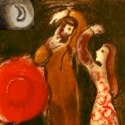|
The great Book of Ruth (ЧһЧ’ЧҷЧңЧӘ ЧЁЧ•ЧӘ) tells a marvelous story of redemptive love and devotion (i.e., chesed: Ч—ЧЎЧ“) dating back to the dark period of Jewish history known as the "time of the Judges" (c. 12th century BC). The story is traditionally read during Shavuot, both because the events recounted took place during the time of the spring harvest (linking it to the agricultural aspect of holiday), and Ruth herself is a picture of willing acceptance of a Jewish lifestyle (linking it to the religious aspect of the holiday). Just as Israel willingly accepted the Torah at Sinai without knowing its content (kol asher diber Adonai na'aseh v'nishmah), so Ruth gave up everything she knew to accept the Torah. Like the people of Israel, Ruth believed in order to understand, not the other way around...
While the narrative of the story is straightforward, to fully understand its spiritual implications we need to be familiar with several laws from the Torah, including the laws of redemption (Lev. 25:32-55), the laws of Shemittah and Jubilee years (Lev. 25:4, 10, 23), the laws of family inheritance (Num. 27:8-11), the laws of yibbum or "levirate marriage" (Deut. 25:5-10), and various farming laws regarding leaving food for the poor and the stranger (Lev. 19:9-10; 23:22; Deut. 24:19). In addition, we need to understand the laws of warfare for taking possession of the land, and God's repeatedly stated commandment that Israel must be holy and not assimilate with surrounding cultures (Exod. 34:12; Deut. 7:1-6; 14:2, etc.). This restriction applied not only to the seven Canaanite nations (Deut. 7:1; 20:17-18), but also to the descendants of Lot (i.e., Amnonites and the Moabites), since they showed enmity to Israel when they first came to the land (Deut. 23:4-6). Indirectly, then, the story of Ruth provides a strong message to Christians: to follow the story of redemption, you must understand the Torah and its commandments!
During the "days of the judges," in Bethlehem of Judah (Ч‘ЦјЦөЧҷЧӘ ЧңЦ¶Ч—Ц¶Чқ, lit. "house of bread"), in the region called Ephratah (ЧҗЦ¶ЧӨЦ°ЧЁЦёЧӘЦёЧ”, lit. "fruitfulness"), lived a man named Elimelech (ЧҗЦұЧңЦҙЧҷЧһЦ¶ЧңЦ¶ЧҡЦ°) and his wife Naomi (Ч ЦёЧўЦіЧһЦҙЧҷ) with their two sons, Machlon and Chilyon. Apparently the names of their sons reflected the hardship of the time: Machlon comes from a verb (ЧһЦёЧңЦёЧ”) that means "to be sick," whereas Chilyon comes from a verb (ЧӣЦёЧңЦёЧ”) that means "to be frail." At any rate, because of the ongoing famine in the land, Elimelech decided to lease out his land and move his family to the land of Moab, where he died shortly afterward, making Naomi a widow. Her sons later married Moabite women: Chilyon married a woman named Orpah, whereas Machlon married the heroine of our story, a young woman named Ruth (ЧЁЧ•ЦјЧӘ). Tragically, both of Naomi's sons died childless, thus leaving her a not only a widow, but also bereft of her children and destitute as well. (Some of the sages state that Elimelech died because he left the land of Israel to go into exile, and his sons died because they married foreign women.) Because of this series of "Job-like" tragedies, Naomi decided to return to the land of Judah, where she had heard the famine had ceased, perhaps so that she could die in the Promised Land.
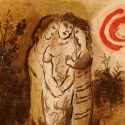
Initially both her daughters-in-law set out with Naomi on the way back to the land of Judah, though she persuaded Orpah to return back to her home. Ruth, on the other hand, "clung" to her mother-in-law and refused to leave her side. After repeatedly testing her motives, Ruth eventually told Naomi: "Do not urge me to leave you or to return from following you. For where you go I will go, and where you lodge I will lodge. Your people shall be my people, and your God my God. Where you die I will die, and there will I be buried. May the LORD (ЧҷЦ°Ч”Ч•ЦёЧ”) do so to me and more also if anything but death parts me from you" (Ruth 1:16-17). Despite Naomi's warning that Ruth would be regarded as an outcast in Israel (Deut. 23:3) who would likely remain a perpetual widow, Ruth refused to be dissuaded. Unlike her sister-in-law Orpah, Ruth was keenly drawn to the truth of the Torah she saw in her mother-in-law, and therefore she willingly chose to leave everything behind for the sake of becoming a proselyte to the one true God. Once Naomi understood Ruth's heartfelt resolve, she accepted Ruth's decision, and the two women arrived in Bethlehem in the early spring, during the time of the barley harvest in Judah.
In order to survive, Naomi sent Ruth into the fields to glean crops, explaining to her the laws of leket and pe'ah (Lev. 19:9-10; 23:22; Deut. 24:19). Ruth "happened" to go to the fields of Boaz, a relative of Naomi's late husband Elimelech. Boaz was immediately attracted to Ruth's modesty and integrity. For instance, he was impressed that Ruth was careful to pick up only one or two stalks of grain, but no more, and also that she bent her knees when she picked up the sheaves, rather than bending down. Boaz was also impressed with Ruth's devotion to her mother-in-law, and he therefore went out of his way to help her.
Naomi understood that Boaz was a "near kinsman" to her husband Elimelech, and therefore he was qualified to redeem her land from those who presently were leasing it. Recall that the Torah allowed for the redemption of land based on its pro rata value before the year of Jubilee. The "law of redemption" required that a next of kin had the duty to redeem (buy back) the land of their close relative if the relative was in such financial difficulty that he was forced to sell it: 'If your brother becomes impoverished and sells some of his property, then his near redeemer (Ч’ЧҗЦІЧңЧ•Ц№ Ч”Ц·Ч§ЦјЦёЧЁЧ‘) shall and redeem (Ч’ЦёЧҗЦ·Чң) what his brother has sold" (Lev. 25:25). Since Naomi was destitute, she needed to persuade a close relative to redeem her land for the legacy of her family's name in Israel.
Now Boaz was a "near kinsmen" to her late husband Elimelech (perhaps the son of Elimelech's brother), so he was legally qualified to redeem the land. Moreover, Boaz was described as a wealthy man and therefore had the financial means be a kinsman redeemer, though he needed to be persuaded to do so. When Naomi detected Boaz's love for Ruth, however, she devised her strategy. Since the laws of inheritance stated that if a man died without a son, the inheritance would be transferred to the daughter (Num. 27:8-11), and since Ruth was the widow of Machlon, she was the legal heir of the line of Elimelech. In other words, if Boaz could be persuaded to marry Ruth, then he could redeem the land and save the family from being obliterated in Israel:
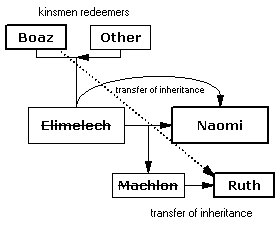 |
After Boaz's period of "courtship" with Ruth during the weeks of the barley harvest, Naomi finally instructed her daughter-in-law to go to the threshing floor to stake her claim that Boaz should redeem her land. Since the law of "Levirate marriage" (yibbum) stated that the brother of a man who died without children had an obligation to marry the widow (Deut. 25:5-10), Ruth - as a childless widow - had the additional legal right to ask for Boaz to perpetuate the family line in Israel by marrying her. Before Boaz could do so, however, Ruth had to express her "legal intent" by claiming him as her "near kinsman." In preparation of this fateful event, Naomi instructed Ruth to beautify herself and present herself before Boaz at the end of the harvest, when the harvesters would be joyfully celebrating God's provision (likely during the holiday of Shavuot). After the feast, Ruth was told that Boaz would sleep at the threshing floor and was instructed to lay at his feet and pull his cloak over her feet to symbolize her claim. Of course nothing improper is implied by the statement that Ruth "uncovered his feet," since the threshing floor was a public place and both Boaz and Ruth were people who carefully honored the LORD.
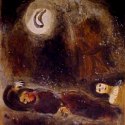
When Boaz later awoke to find his feet uncovered, he found Ruth laying at his feet, who then expressed her claim to him: "Spread your wings over your servant, for you are a redeemer" (Ruth 3:9). Boaz was overjoyed at the prospect, though he explained that there was someone who had a precedent right to redeem her - a "kinsman nearer than I" - though the text does not name this closer relative of Elimelech (perhaps it was his brother). Ruth stayed the rest of the night at the threshing floor and Boaz promised to settle the question as soon as he was able. Before sunrise, she returned to Naomi who asked her if she was now "engaged to Boaz" (i.e., ЧһЦҙЧҷЦҫЧҗЦ·ЧӘЦјЦ° Ч‘ЦјЦҙЧӘЦјЦҙЧҷ, "who are you, my daughter?"). After learning all the details, Naomi assured her daughter-in-law that Boaz would not rest until he settled the matter that very day (Ruth 3:18).
Boaz then went directly to the gate of the city of Bethlehem and waited to discuss the matter of redeeming Elimelech's land with the closer relative who was legally entitled to make the first claim. When the man appeared, Boaz called for a minyan (a group of ten to required to settle legal questions) and presented the initial terms of redemption to him. When the man agreed to redeem the land, Boaz mentioned the additional condition that the redeemer would be required to marry Ruth the Moabitess, since she was the childless widow of Machlon (the son of Elimelech), and the law required the redeemer to "raise up the name of the dead" (i.e., raise an heir) to preserve the family line in Israel. Upon hearing this, the man said he could not redeem it, since it would mar his inheritance, and therefore he "removed his shoe" to signify that he withdrew his claim (this rather odd custom is called chalitzah: Ч—ЦІЧңЦҙЧҷЧҰЦёЧ”). The legal transaction, along with Boaz's statement of intent to redeem Elimelech's land and marry Ruth, is stated in Ruth 4:8-10.
After hearing Boaz's statement of intent, the witnesses present then blessed Ruth: "May the LORD make the woman, who is coming into your house, like Rachel and Leah, who together built up the house of Israel. May you act worthily in Ephratah and be renowned in Bethlehem, and may your house be like the house of Perez, whom Tamar bore to Judah, because of the offspring that the LORD will give you by this young woman" (Ruth 4:11-12).
The book ends with the marriage of Boaz and Ruth, and the birth of their first son. The women of Bethlehem then rejoiced with Naomi, since she now had an heir to her family line and a secure future. Naomi became the baby's nurse and apparently adopted the child. "And the women of the neighborhood gave him a name, saying, "A son has been born to Naomi." They named him Oved ("servant"). He was the father of Jesse, the father of David" (Ruth 4:17). The book ends with the genealogy of the House of David, from the birth of Perez (Judah's son from Tamar) to the birth of King David.
Again, by faith we have to push past the enmity required by the Torah with its commandments and ordinances to receive our healing - and to find our place within the family of God... In this connection it is interesting to see that King David's genealogy not only included the noble line of Abraham/Sarah, Isaac/Rebekah and Jacob/Leah, but it also included Judah/Tamar, Boaz/Ruth, and Salmon/Rahab. Moreover, in the genealogy of Yeshua the Messiah given in Matthew (1:1-16), only four women (besides Mary) are explicitly named: Tamar (who seduced her father-in-law), Rahab (a prostitute), Ruth (a Moabitess), and "the wife of Uriah" (i.e., Bathsheba, an adulteress). Each of these women of faith illustrate that God's love and grace overcomes His judgment. Here is a (very simplified) diagram I made to indicate some of the relationships:
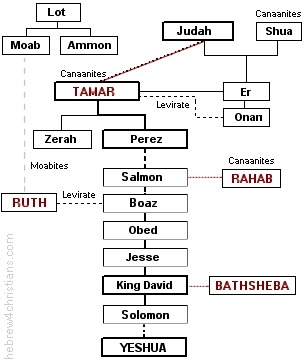 |
Ultimately, Ruth's teshuvah was accepted, even though she was an outcast - a Moabite of whom the Torah stated: "none of them may enter the assembly of the LORD forever" (Deut. 23:3). Ruth's great faith was not unlike that of the Canaanite woman who was accepted by Yeshua (Matt. 15:22-28). Both women overcome even the law of the Torah by faith in God's chesed and grace... In the case of Ruth, her faith enabled the House of David to come - and from this, the line of Yeshua our Messiah and Savior...
ЧӣЦјЦҙЧҷ ЧҗЦ¶ЧңЦҫЧҗЦІЧ©ЧҒЦ¶ЧЁ ЧӘЦјЦөЧңЦ°ЧӣЦҙЧҷ ЧҗЦөЧңЦөЧҡЦ°
Ч•ЦјЧ‘Ц·ЧҗЦІЧ©ЧҒЦ¶ЧЁ ЧӘЦјЦёЧңЦҙЧҷЧ ЦҙЧҷ ЧҗЦёЧңЦҙЧҷЧҹ
ЧўЦ·ЧһЦјЦөЧҡЦ° ЧўЦ·ЧһЦјЦҙЧҷ Ч•ЦөЧҗЧңЧ”Ц·ЧҷЦҙЧҡЦ° ЧҗЦұЧңЧ”ЦёЧҷ
ki В· el В· aВ·sher В· telВ·khi В· eВ·lekh
uВ·vaВ·aВ·sher В· taВ·liВ·ni В· aВ·lin
aВ·mekh В· amВ·mi В· veВ·loВ·haВ·yikh В· EВ·loВ·hai

"For where you go I will go
and where you lodge, I will lodge
your people shall be my people, and your God my God."
(Ruth 1:16)
The blessing given to Boaz, "May your house be like the house of Perez, whom Tamar bore to Judah, because of the offspring that the Lord will give you by this young woman" (Ruth 4:12), suggests that God's plan of blessing providentially overcame the weakness and frailty of all the people involved... It is encouraging, is it not, that no matter what your personal background, God can use you to accomplish His will...
The story of Ruth dramatically illustrates that the law by itself is unable to redeem us (as typified by the unnamed redeemer who did not wish to "mar" his inheritance), and therefore something more is needed. A true go'el (Ч’ЧҗЦөЧң), or "kinsman redeemer," is marked by love and compassion, just as the law of the Spirit of life (ЧӘЦјЧ•Ц№ЧЁЦ·ЧӘ ЧЁЧ•ЦјЧ—Ц· Ч”Ц·Ч—Ц·ЧҷЦјЦҙЧҷЧқ) is what sets us free from the law of sin and death (ЧӘЦјЧ•Ц№ЧЁЦ·ЧӘ Ч”Ц·Ч—ЦөЧҳЦ°Чҗ Ч•Ц°Ч”Ц·ЧһЦјЦёЧ•Ц¶ЧӘ). Ruth overcame the "letter of the law" by faith in God's redemptive love, just as Yeshua overcame the judgment of the law by means of God's greater love...
Like Ruth, we have to "go to the threshing floor" as a forbidden outsider to lay claim to the redeeming love of God. We have to say to the LORD, "Spread your wings over your servant, for you are my redeemer" (Ruth 3:9). Again, we must take courage to push past the enmity required by the Torah with its commandments and ordinances to receive our healing - and to find our place within the family of God...
Hebrew Lesson
Ruth 1:16a reading (click):
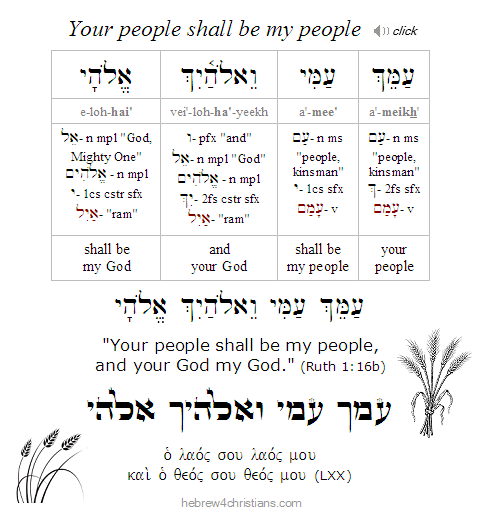 |
|

